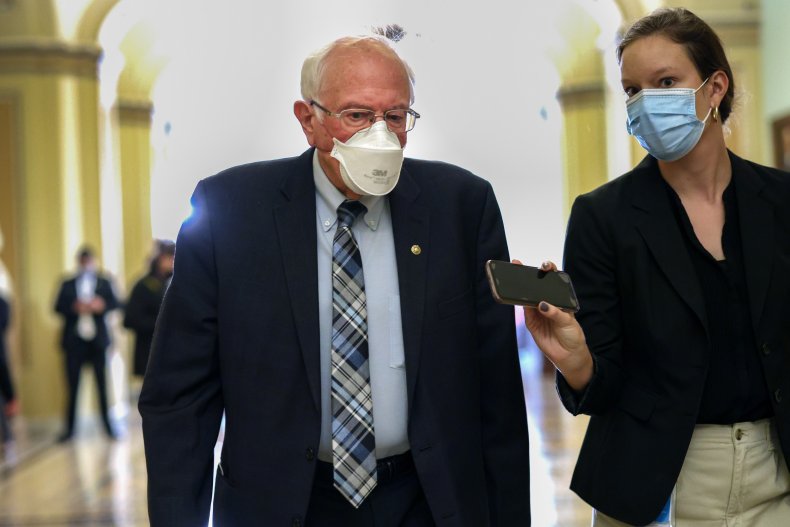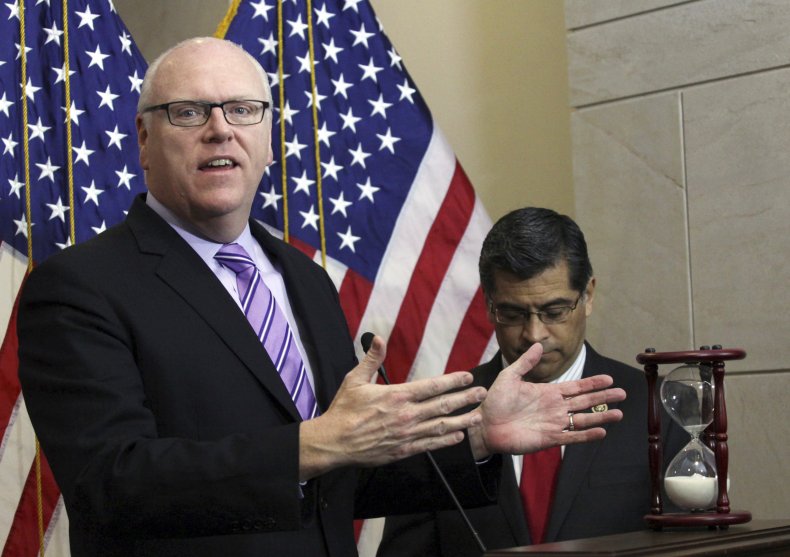Vermont Senator Bernie Sanders has pledged to not accept any further cuts to the massive spending package still making its way through Congress, saying the $3.5 trillion cost is enough of a compromise, the Associated Press reported.
Sanders has also called for tax increases on America's top earners to cover the cost, which he says both Democrat and Republican working-class voters would find acceptable.
Sanders headed the drafting of the $3.5 trillion budget proposal after other progressive Democratic Congress members called for spending plans costing up to $6 trillion, the AP said. House Democrats have proposed a 26.5 percent top corporate tax rate to help finance the spending package, but some party members think the rate should be higher or lower.
President Joe Biden has had a target of 28 percent, while moderates like West Virginia Senator Joe Manchin have called for 25 percent. There is also disagreement in the party over what the top tax rate should be for capital gains, with Biden calling for 39.6 percent and House Democrats looking for 25 percent, the AP said. Those Democrats are also looking to add a 3 percent surcharge on individual incomes above $5 million.
For more reporting from the Associated Press, see below.

The Democratic Party is again confronting the competing political priorities between its progressive and moderate wings. The House version of the bill that was drafted this week ushered in a new phase of the debate that could test whether Democrats can match their bold campaign rhetoric on everything from income inequality to climate change with actual legislation.
Any stumble may have serious consequences for Democrats' prospects during next year's midterms, when they'll try to prevent Republicans from retaking Congress. The finished product could alienate centrists who say it goes too far, or frustrate those on the left who argue it's too timid at a moment of great consequence.
"This is critically important for Democrats and for their message in next year's election," said former New York congressman Joe Crowley, a veteran Democrat who was upset in the 2018 primary by a progressive star, Representative Alexandria Ocasio-Cortez. "We're going to blink and we're going to be in 2022."
Crowley said bills proposing trillions of dollars in spending were "simply something I never had to deal with in my 20 years" in office. "These are enormous figures by any standard," he said.
But, Crowley added, no matter the final price tag, "let's not lose sight of the fact that this will be transformational regardless."
With Republicans universally opposed to the bill, Democratic leaders have a narrow path as they navigate an evenly divided Senate and thin House majority.
Many Democrats agree on the goals included in the legislation, such as providing universal pre-kindergarten and tuition-free community college while increasing federal funding for child care, paid family leave and combating climate change. The party also is aiming to expand health care coverage through Medicare and create pathways to citizenship for millions of immigrants in the country illegally.
But there are differences over how much such a measure should cost and how it should be paid for.
Democratic Senators Manchin and Kyrsten Sinema of Arizona, who met privately with Biden on Wednesday, have balked at the $3.5 trillion cost.
"There's a supposition by our friends on the progressive left that it hardly matters what you do, as long as it's big," said Will Marshall, president of the Progressive Policy Institute, a centrist Washington think tank.
Instead, Democrats are ideologically diverse enough that "people who run in competitive races simply can't embrace the same kind of ideas that people who run in safe, blue Democratic districts," Marshall said.
Joseph Geevarghese, executive director of the progressive activist group Our Revolution, countered that "it would be incredibly problematic for the president to say, 'Look, we won both chambers of Congress. We won the White House. We couldn't deliver better health care, we couldn't deliver transformational change on the climate.'"
"It is not going to be explainable to the American people," Geevarghese said, "and I think there'll be consequences as a result."
Democrats have been here before. The progressive versus moderate divide dominated the early stages of the party's 2020 presidential primary with Biden and Sanders serving as the most prominent representatives of each end of the spectrum.
Sanders, an independent who caucuses with the Democrats, scored early victories. But the party ultimately coalesced around Biden in part because of an urgent desire to unify behind a candidate who could have the broadest appeal and defeat then-President Donald Trump.
Since then, Biden has largely kept the party unified by adopting many top progressive priorities, such as spearheading a $1.9 trillion coronavirus relief bill that passed in March, reducing student loan debt for millions of Americans and supporting a now-stalled proposal to raise the national minimum wage to $15 per hour. He has resisted, however, some of the biggest progressive goals, including the universal health care proposal known as Medicare for All.
But it's unclear whether that equilibrium can be maintained.
Already, Our Revolution and other progressive activists have staged protests outside the offices of Manchin and other moderates. They've begun proudly referring to themselves as the "tea party of the left," out to stymie the actions of "obstructionist corporate Democrats."
Manchin is so far unmoved. "I've been very clear and very open" about the need to reduce the budget bill's price tag, he said.
In the House, meanwhile, Democratic Florida Representative Stephanie Murphy, head of the moderate Blue Dog Coalition, opposed parts of the spending package in committee, arguing that her party's effort to muscle it through was too rushed.
Progressives, though, have responded by playing their own legislative hardball. Representative Pramila Jayapal of Washington, co-chairwoman of the 96-member House Progressive Caucus, said the group remains unified behind a vow not to support a separate bill that many moderate Democrats are more excited about—a $1 trillion, bipartisan public works measure—until the budget bill advances.
"Joe Manchin has power, of course. We need his vote. But so do, really, every single one of us, because in the House, [Democrats] have a margin of three votes," Jayapal said on a conference call with progressive activists. "Everyone's a Joe Manchin here."
Marshall said many voters in battleground House districts do indeed applaud higher levies for the wealthy as "tax fairness," but that support wanes if additional spending focuses more on social programs than economic stimulus.
"It has to be tied to a plan to create good jobs, spur innovation and growth," said Marshall, who added that many in swing districts have also expressed concerns about running up federal debts and contributing to rising inflation—fears that could be alleviated by efforts to strengthen the post-pandemic economy.
Still, he said, it would be even more costly for Democrats if the squabbles over the budget proposal's final price tag drag on.
"I think Democrats will find a way to compose their differences simply because they can't afford to have this president fail," Marshall said. "The margins are just too narrow."

"accept" - Google News
September 17, 2021 at 12:00AM
https://ift.tt/3Elk7RP
Bernie Sanders Won't Accept Further Cuts to Spending Package, Calls for Tax Increases - Newsweek
"accept" - Google News
https://ift.tt/2YsXkRf
https://ift.tt/3d2Wjnc
Bagikan Berita Ini














0 Response to "Bernie Sanders Won't Accept Further Cuts to Spending Package, Calls for Tax Increases - Newsweek"
Post a Comment